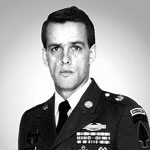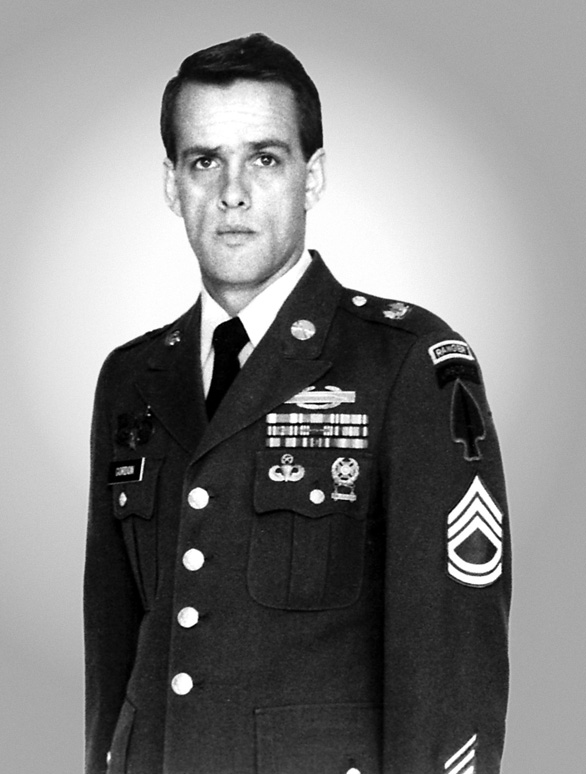MSG Gary Ivan Gordon

Unit: 1st Special Forces - Delta Force
Age: 33
Home Town: Lincoln, ME
Died On: 10/03/1993
MSgt. Gary I. Gordon was a smart kid, his teachers used to say, but he spent entirely too much time doodling. Tanks, battleships, helicopters, “anything and everything military-related,” his mother, Betty Gordon, says from her home in Lincoln, Maine. But even though his imagination often drifted to things combative, his mother was surprised the day her son, then 17, announced he had joined the Army. He graduated from Mattanawcook Academy in 1978.
Gordon was deployed to Mogadishu, Somalia with other Delta members in the summer of 1993 as part of Task Force Ranger. On October 3, 1993 Gordon was Sniper Team Leader during Operation Gothic Serpent, a joint-force assault mission to apprehend key advisers to Somali warlord Mohamed Farrah Aidid. During the assault, Super Six One, one of the Army's Black Hawk helicopters providing insertion and air support to the assault team, was shot down and crashed in the city. A Combat Search and Rescue team was dispatched to the first crash site to secure it and a short time later Super Six Four was shot down as well. Ranger forces on the ground were not able to assist the downed helicopter crew of the second crash site as they were already engaged in heavy combat with Aidid's militia and making their way to the first crash site.
Gordon and his Delta Force sniper teammates Sergeant First Class Randall Shughart and Sergeant First Class Brad Hallings, who were providing sniper cover from the air, wanted to be dropped at the second crash site in order to protect the four critically wounded crew, despite the fact that large numbers of armed, hostile Somalis were converging on the area. Mission commanders denied Gordon's request, saying that the situation was already too dangerous for the three Delta snipers to effectively protect the Blackhawk crew from the ground. Command's position was that the snipers could be of more assistance by continuing to provide air cover. Gordon, however, concluded that there was no way the Black Hawk crew could survive on their own, and repeated his request twice until he finally received permission. Sergeant First Class Brad Hallings had assumed control of a minigun after a crew chief was injured and was not inserted with Shughart and Gordon.
Once on the ground, Gordon and Shughart, armed with only their personal weapons and sidearms, fought their way to the downed Blackhawk. By this time more Somalis were arriving who were intent on either capturing or killing the American servicemen. When they reached Super Six Four, Gordon and Shughart extracted the pilot, Chief Warrant Officer Mike Durant and the other crew members from the aircraft, and established defensive positions around the crash site. Despite having inflicted heavy casualties against the Somalis, the two Delta snipers were too outnumbered and outgunned. Their ammunition nearly depleted, Gordon and Shughart were killed by Somali gunfire. It is believed that Gordon was first to be killed. His teammate Shughart retrieved Gordon's CAR-15 and gave it to Durant to use. Shortly after, Shughart was killed and Durant was taken alive. Immediately after the battle, the Somalis counted 24 of their own men dead with many more severely wounded.
He died there in Somalia October 3, 1993 and is buried in Lincoln Cemetery, Penobscot County, Maine.
His family remembers a quiet man with an artistic flair and a desire to write books about children. “He didn't talk much about his job, but I know he loved it a lot. It was like the ultimate job to him, being in that unit,” his wife, Carmen, says of her husband's affiliation with soldiers attached to U.S. Army Special Forces Command, Fort Bragg, N.C.
“He didn't bring the military home though,” she says. “The Gary I saw was all about family . . . and his children. He had these special times with Brittany and Ian,” like on Sunday mornings when he would spread the Sunday newspaper out on the kitchen table, she says. Brittany, 3, “always had to be a part of the newspaper thing,” say Carmen Gordon, 29. “Gary would give her a sheet of newspaper and pour a little bit of coffee into her sip cup, and she'd sit there and mimic his every move, right down to the elbows on the table.”
And there were the woodworking sessions with Ian, 6. “When Gary made furniture, Ian was always out there right by his side. Gary would give him some wood scraps, a hammer and a big thing of Elmer's glue, and there they were, the both of them covered in saw dust,” Carmen Gordon says.
After his death, Carmen Gordon went through his personal items and came across a letter her husband had written nearly five years before while in a hangar in Panama during Operation Just Cause. “It was filled with dreams of Ian growing up strong and of having grandchildren on his knee, but his last words were: ‘In case something should happen to me, be strong, never give up, and always look inside yourself for strength.’ “Knowing that he felt I was strong makes me want to carry on.”
Medal of Honor citation
Master Sergeant Gordon, United States Army, distinguished himself by actions above and beyond the call of duty on 3 October 1993, while serving as Sniper Team Leader, United States Army Special Operations Command with Task Force Ranger in Mogadishu, Somalia. Master Sergeant Gordon's sniper team provided precision fires from the lead helicopter during an assault and at two helicopter crash sites, while subjected to intense automatic weapons and rocket propelled grenade fires. When Master Sergeant Gordon learned that ground forces were not immediately available to secure the second crash site, he and another sniper unhesitatingly volunteered to be inserted to protect the four critically wounded personnel, despite being well aware of the growing number of enemy personnel closing in on the site. After his third request to be inserted, Master Sergeant Gordon received permission to perform his volunteer mission. When debris and enemy ground fires at the site caused them to abort the first attempt, Master Sergeant Gordon was inserted one hundred meters south of the crash site. Equipped with only his sniper rifle and a pistol, Master Sergeant Gordon and his fellow sniper, while under intense small arms fire from the enemy, fought their way through a dense maze of shanties and shacks to reach the critically injured crew members. Master Sergeant Gordon immediately pulled the pilot and the other crew members from the aircraft, establishing a perimeter which placed him and his fellow sniper in the most vulnerable position. Master Sergeant Gordon used his long range rifle and side arm to kill an undetermined number of attackers until he depleted his ammunition. Master Sergeant Gordon then went back to the wreckage, recovering some of the crew's weapons and ammunition. Despite the fact that he was critically low on ammunition, he provided some of it to the dazed pilot and then radioed for help. Master Sergeant Gordon continued to travel the perimeter, protecting the downed crew. After his team member was fatally wounded and his own rifle ammunition exhausted, Master Sergeant Gordon returned to the wreckage, recovering a rifle with the last five rounds of ammunition and gave it to the pilot with the words, "good luck." Then, armed only with his pistol, Master Sergeant Gordon continued to fight until he was fatally wounded. His actions saved the pilot's life. Master Sergeant Gordon's extraordinary heroism and devotion to duty were in keeping with the highest standards of military service and reflect great credit upon him, his unit and the United States Army.
